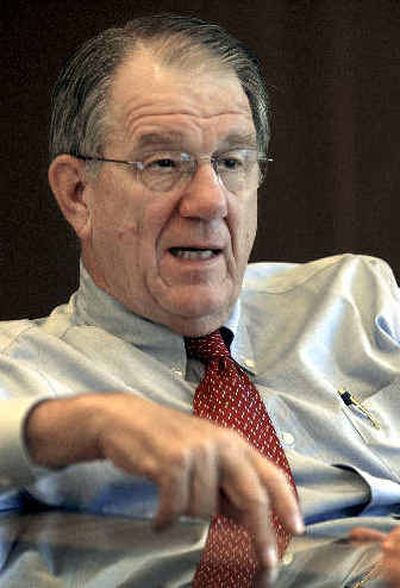Affair proves kiss of death

Memo to chief executives:
This probably is not the best time to have an affair with an employee.
That’s a lesson that Boeing Co. Chief Executive Officer and President Harry Stonecipher, 68, learned the hard way Sunday when he was asked to resign for what the Chicago-based defense and aerospace company said Monday was a breach of its code of conduct.
The breach stemmed from a relationship – said to be consensual – that Boeing said Stonecipher, a married man, had with a female Boeing executive, who did not report to him directly.
James Bell, Boeing’s chief financial officer, will take over on an interim basis, said Boeing’s board chairman, Lewis Platt.
Platt said in a statement that it wasn’t the relationship alone that led to Stonecipher’s resignation. “The board concluded that the facts reflected poorly on Harry’s judgment and would impair his ability to lead the company,” Platt said, declining to be more specific.
The unnamed female executive remains with the company.
Stonecipher’s resignation takes place in a time of post-Enron corporate skittishness combined with increased attention in Washington to moral values.
A lapse in such values could “have an impact with the religious right,” said executive coach and author Marjorie Brody, of Brody Communications in Jenkintown, Pa. “Who is going to be making the buying decisions for Boeing? What is the impact of this transgression?”
Ever since former President Clinton had an affair with an intern, there’s been heightened awareness of the risks of workplace romance, experts said.
Then the corporate accounting scandals of Enron and WorldCom turned more public and regulatory attention onto executive practices. Ethics legislation ensued and some companies set up whistle-blower networks. A report through Boeing’s network led to Stonecipher’s ouster.
Also, directors are warily eyeing a proposed investors’ lawsuit settlement with WorldCom Inc. that would take $18 million directly out of the pockets of some board members of the telecom company.
“Everyone is more concerned about corporate reputation and the damage these things can do,” said Doreen Kelly Ruyak, communications vice president for the National Association of Corporate Directors.
“There is certainly a heightened awareness of directors’ liabilities,” she said, although she added she had no knowledge of the Boeing incident.
Boeing has had its share of corporate missteps.
Stonecipher, who stressed strict adherence to ethical standards, had been brought out of retirement in December 2003 to clean up Boeing. Former chief executive officer Philip Condit had lost his job over a U.S. Air Force scandal that sent two executives to jail.
But Boeing was gaining traction. On Friday, the U.S. Air Force reinstated Boeing as a contractor for its rocket program. It had been suspended in July 2003.
Last month, former chief financial officer Michael Sears was sentenced to four months in prison for offering a job to Air Force chief Darleen Druyun as they negotiated a $23 billion contract. She’s now serving a nine-month term in prison.
Boeing’s shares had been trading at three-year highs. Shares rose 52 percent during Stonecipher’s tenure. They dropped just eight cents Monday, closing at $58.30.
“I think it was pretty gutsy of them to fire him, given his performance,” Brody said. “Because someone does a good job do you let him get away with things?”
David Shabot, managing partner at the Philadelphia office of Korn/Ferry International, an executive search firm, said companies are now more interested in “squeaky clean” candidates.
Even a rumor of an affair with an employee in a previous job can scotch an executive’s job prospects – especially if the corporate culture stresses family values. “But in a work-hard, play-hard culture, it may not be viewed as negatively,” said Shabot.
Romantic relationships at the corporate officer level are problematic, whatever the size of the company, say two top human resources executives from the MidAtlantic Employers’ Association in Valley Forge, Pa.
Rose Russell and Paula Gill staff a hotline to answer calls from the association’s members in Pennsylvania, New Jersey and Delaware.
Besides outright sexual harassment, there are also issues of distraction and favoritism.
Yes, these relationships are consensual, said Russell, “until one of them breaks up and suddenly it’s harassment.”
Russell and Gill say they are now getting calls from employees at an area firm with a CEO who employees say is having a relationship with another executive.
The employees say the subordinate executive is abusive toward employees but that the CEO can’t see the problem and won’t listen to complaints.